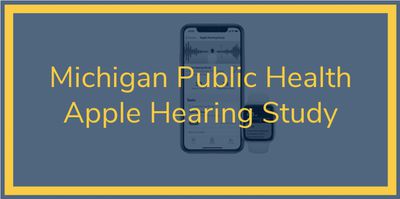Apple device owners who participated in the Apple Hearing Study that Apple is conducting with the University of Michigan School of Public Health are today receiving emails letting them know about a bug that resulted in excess data collection.

Those who enrolled in the study consented to allow Apple and researchers to collect headphone sound level, environmental sound level, heart rate, and workout data types. The data is used to help researchers better understand the link between long-term sound exposure and the impact on hearing health.
According to the email participants are receiving, a bug in the study caused up to 30 days worth of historical data to be collected. Data collection did not fall outside of what was consented to when participants signed up, but the sign up form did not mention the collection of historical data.
Thank you for your participation in the Apple Hearing Study. When you enrolled in the study, you provided consent to collect certain headphone sound level, environmental sound level, heart rate, and workout data types during the enrollment process. This data is collected to help researchers, listed in the consent form, understand the link between long-term sound exposure and its impact on hearing health. We recently learned that due to a bug, after study enrollment, the Apple Hearing Study unintentionally collected up to 30 days of historical data for these authorized data types. The study only collected data after your consent was obtained. However, the study consent form does not state that historical data will be collected.
The bug has now been fixed with a study app update and historical data received to date have been deleted. We remain committed to your privacy and will continue to monitor for and delete any additional historical data if received until you update your Apple Research app. Please update your Apple Research app to the latest version here, to receive the fix.
At no time did Apple have access to information collected from the Apple Research app that could directly identify you. Please refer to the study informed consent form for additional details on the data that is being collected, how your data is stored, and who your data might be shared with for the purposes of the study.
Richard Neitzel, the principal investigator in the study, says that Apple did not have access to information collected from the Apple Research app that could be used for identification purposes.
The bug has been addressed with an update to the Apple Research app and historical data received to data has been deleted. To ensure no further historical data collection, participants are being asked to update their Apple Research apps.


















